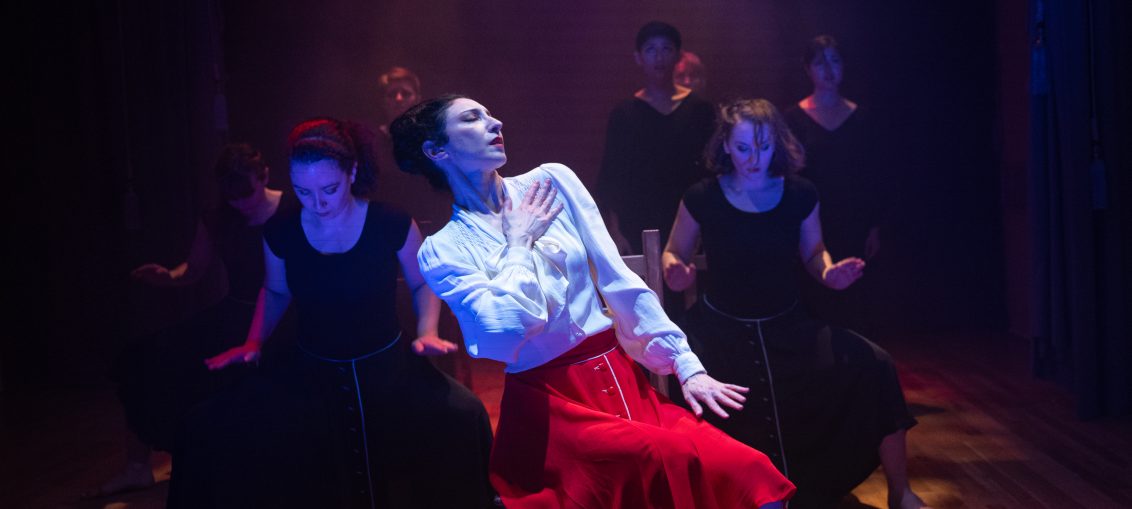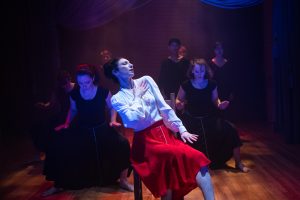

Co-Creator/Co-Choreographer/Director/Producer/Lead Performer Cassandra Rosebeetle and Co- Creator/Composer/Librettist JL Marlor describe The Final Veil as a movement opera. Unlike traditional opera, The Final Veil is scored for a string quartet and best experienced in a smaller space like the cell theatre. The female and non-binary quartet of singers and trio of dancers form a unified ensemble – a nuanced rethinking of Ancient Greek and grand opera choruses. The resulting hour-long work is devastating.
The “final veil” refers to the last moments of Franceska Mann (Cassandra Rosebeetle) life. The German invasion of Poland starting World War II ended her promising career. The 25-year-old Jewish dancer was first relocated to the Warsaw Ghetto and then to a hotel with the promise of safe passage out of Nazi-occupied territory. Instead, she was sent to Auschwitz. Selected for disinfection (the Nazi’s sick euphemism for the gas chamber), she distracted guards by seductively removing her clothes. Then she struck one with her shoe, grabbed his pistol and killed him. She managed to get off a shot at another before she was killed.
Franceska’s corpse titillated other SS, which is where the opera begins. Through a series of scenes, we see her perform in a Romantic-era ballet costume, with her first audience being an adoring public, and the next a captive one of a different kind in the Ghetto. Rosebeetle and co-choreographer Katherine Crockett never alter Franceska’s dance or Degas dancer demeanor. Retaining her otherworldly dignity lead to the realization of her final act.
Dancers Hallie Chametzky, Lauren Pagano and Lauren Barette portray Franceska’s interior monologue. They are the ancient trio known by many names – Fates, Graces, Holy Spirit – guiding her fearlessness. When linking arms in a folk dance, they demonstrate the cultural similarities of both Allied and Axis nations as effectively as any historic narrative.
Heather Michele, Katie Lipow, Abagael Cheng, Katherine Lerner Lee perform the dewy Coward-inspired love song Franceska dances to that becomes increasingly desperate with each interpretation. They are also her voice, raised most effectively when her optimism on the train turns to horror when she realizes her destination. The audience knows it too when rhythmic rolling train motion becomes a high-pitched screech. The singers then repeat the words “Arbeit macht frei” (Work sets you free) – the sign on Auschwitz’s front gate.
Both the dancers and singers bear witness to the Holocaust. The four singers stand in a circle holding hands in prayer while reciting a history of Auschwitz. The dancers are the train passengers who become prisoners. One suitcase contains only ballet slippers.
There is no music when Franceska strips for her final dance. Rosebeetle is deliberate: Franceska is ultimately dancing for herself and deciding how she will die. There are no guns onstage. A screen unfolds from the ceiling and lands loudly onstage covering Franceska, listing what followed and quoting survivors.
The last music is Mordecai Gebirtig’s Our Town is Burning, sung a cappella. His 1936 poem became a Warsaw Ghetto resistance song and still performed at Holocaust memorials. Translation of the final Yiddish verse had meaning then – and now:
It’s burning, brothers! Our town is burning!
And our salvation hands on you alone.
If our town is dear to you,
Grab the buckets, douse the fire!
Show that you know how!
Don’t stand there, brothers, looking on
With futile, folded arms,
Don’t stand there, brothers, douse the fire! —
Our poor village burns!
The Final Veil opened on Sunday, July 17 and runs Thursdays-Sundays through July 31 at the cell theatre (338 West 23rd Street NYC). Due to high demand, an addition performance has been added for Wednesday, July 27 at 8pm. Tickets can be purchased here. the cell requires proof of vaccination and wearing masks within their performing space.
 Wednesday, January 7, 2026
Wednesday, January 7, 2026